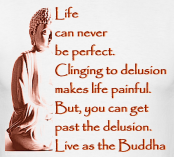"If you hate a person, you hate something in him that is part of yourself. What isn't part of ourselves doesn't disturb us."
-Hermann HesseOur individual identities are the result of repeated interactions with society over time. As our experiences, reactions, and discoveries accrue, we come to understand with greater and greater accuracy who it is that we are. And while, as is obvious from this blog, I am a big believer in knowing oneself on a deep level, I have also noticed a significant problem. It seems to me that this whole identity formation process can have a remarkably anti-social effect on people. Once we decide, for example, that we are a person of "faith" we become resistant and hostile towards those people who have concluded that they are people of science. When we decide that we are "a liberal" or "a conservative" we develop an animosity and a fear towards those who have decided otherwise. People who define themselves as people of reason can become threatened by the slightest sign of emotional decision-making, and those who consider themselves "passionate" people may over time become quite reactive to analytical types. As our lives progress, and we continue to fine tune our personal identities, all of this splitting and social distancing only worsens. And yet, maybe the problem is that we're going about this whole identity thing in the wrong way.
If the wisdom of Carl Jung is to be believed, our hostility towards others actually results from the fact that these others represent repressed aspects of ourselves. Jung believed that, while we come into this world with our own unique strengths and leanings of temperament, we are also born with full access to the spectrum of human potential. We all have both thoughts and emotions, scientific and spiritual capabilities, liberal and conservative tendencies. Over time, however, as we develop individual paths through life, we inevitably ignore, forget, and repress those parts of ourselves that seem to conflict with, and threaten the people we become. Jung used the term Shadow Self to refer to all of the neglected and ignored capacities that lay dormant within us. Consequently, we may have strong reactions to people who represent our shadow selves (i.e. the people we could have become had things been different). Here's an examples of how this whole shadow thing plays out...
1. A guy and a gal fall in love and get married. They buy a house, have kids, and before long some resentment begins to build. The wife becomes upset because she is taking responsibility for all of the child-rearing and the laundry and the dishes and the shopping. The husband, meanwhile, becomes upset because the wife doesn't ever think about anything interesting other than the "to do" list. And over time, the wife develops the identity of the practical one, the person who gets things done. She begins to take pride in not having time for frivolous thoughts, and she actually begins to hate that esoteric part of herself. The guy, meanwhile, decides that he must be this really brilliant guy and he begins to hate his practical side, which would otherwise prevent him from thinking about his big ideas. Ultimately, the couple ends up with an interpersonal divide. The husband's practical side has become his shadow and the wife's abstract-thinking side has become her shadow. And the animosity that they develop towards one another is actually hatred of their inner repressed selves.
One can imagine how the above situation appears in all areas of society. As individuals, we take on identities as police officers, as scientists, as entreprenuers, as soldiers, as preachers. Within our various groups, meanwhile, we may take on the role of the "strong one" or the "helpful one" or the "compassionate one." And as we focus on those qualities that best serve us in our respective roles, we lose touch with, and develop a certain resentment towards, our shadows. We repress our "liberal" side or our "conservative" side, our emotional side or our rational thinking side, our vulnerable side or our strong side. And we become emotionally reactive and hostile towards people who represent these opposing qualities. Families fracture, as do workplaces, cities, countries, and international communities. And it's partly because of the fact that we're missing a big step in growing up, which is to develop an integrated self, rather than a fractured one. In the example of the married couple, I think there is a lot to be gained by this husband and wife realizing that, over the years, they have each lost part of themselves. They need to work on getting back in touch with their shadows if they are to become whole again and less reactive towards one another. The husband needs to claim his "to-do list" self, and the wife her brilliant, abstract thinking self. Only then can they begin to accept one another again. Incidentally, this "example" is certainly something my wife and I have experienced, as I know a lot of other couples have. So this post is dedicated to us getting back in touch with our shadow selves, as we've been working on doing for some time now. As a final note, here are my thoughts for how this whole "shadow self" problem fits into my model for adult development...
Identity Formation
Paradoxical vs. Split














